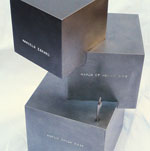
 The World Mayor Prize, created by Tann vom Hove, designed by Manuel Ferrari and sculptured by Kaspar Swankey  FRONT PAGE About World Mayor    • THE 2014 WINNERS • THE 2014 PROJECT • WM HISTORY • The 2014 shortlist • The 2014 longlist • Code of Ethics • The World Mayor Prize  The 2012 results The 2012 project The 2012 shortlist The 2012 long-list Code of Ethics | Código de Ética | The World Mayor Prize World Mayor Prize winners exchange letters  Mayor of Bilbao debates Mayor of Perth debates Mayor of Bilbao interview Mayor of Perth profile  For Mayor of Amuwo Odofin For Mayor of Angeles City For Mayor of Ankara For Mayor of Auckland For Mayor of Bilbao For Mayor of Changwon City For Mayor of El Paso For Mayor of Ljubljana For Mayor of Matamoros For Mayor of Minneapolis For Mayor of Newark For Mayor of Perth For Mayor of Puerto Montt For Mayor of Quebec City For Mayor of Surakarta For Mayor of Tel Aviv For Mayor of Zeralda  The 2010 results The 2010 project The 2010 finalists Marcelo Ebrard says thank you Mick Cornett says thank you Helen Zille and Marcelo Ebrard exchange letters  The 2008 results The 2008 project The 2008 finalists The World Mayor Award Helen Zille thanks supporters Mayors of Melbourne and Cape Town exchange letters  The 2006 results Methodology The 2006 finalists The World Mayor Award Dora Bakoyannis congratulates John So  The 2005 results Contest methodology List of finalists Winning mayors write Mayor Rama writes - Mayor Bakoyannis replies  The 2004 contest List of all 2004 finalists Edi Rama wins 2004 award People ask - Edi Rama replies  Front Page Site Search About City Mayors |
Some 463,000 people took part
8 January 2013: The aims of the international World Mayor Project, launched by the urban affairs think tank City Mayors Foundation in January 2004, are twofold. First, City Mayors seeks to raise the profile of mayors worldwide by honouring those who have served their communities well, governed openly and honestly, as well as making significant contributions to cities nationally and internationally. The second objective of World Mayor is to involve as many people as possible from all parts of the world in the project. From the outset, the World Mayor Project was set up to commend mayors chosen by a large international audience rather than by acclamation by a panel of ‘experts’. |
|
World region
|
2010 votes
|
2012 votes
|
| Europe |
61,180
|
97,230
|
| USA & Canada |
64,400
|
92,600
|
| Latin America |
96,600
|
69,450
|
| Asia |
74,060
|
152,790
|
| Australasia |
16,100
|
27,780
|
| Africa |
9,660
|
23,150
|
geographically identifiable votes
The final results
In December 2012 the Fellows of The City Mayors Foundation drew up a list of ten mayors who stood out in terms of numbers of votes, achievements and quality of testimonials from their supporters.
The total number of votes cast for the mayors in the top ten exceeded 257,000, with some Asian mayors receiving tens of thousands of votes each. But the number of votes received by individual top-ten mayors was only considered secondary by the judging Fellows. The panel was primarily influenced by the arguments and persuasiveness of testimonials bestowed on mayors. As some city leaders in the top ten represent cities of several million people, while others are mayors of much smaller towns, the City Mayors panel of Fellows was of the opinion that basing judgment on numbers alone would unfairly disadvantage mayors from smaller towns.
The panel was also very much aware that an outstanding mayor from a city in the developing world requires vastly different qualities than one from Western Europe or North America. The winner of the annual World Mayor Prize is therefore never described in terms such as ‘the world’s best mayor’. RESULTS IN FULL
The World Mayor Prize sculpture
French artist Manuel Ferrari designed the World Mayor Prize sculpture in 2004. The City Mayors Foundation invited the artist to create a sculpture that was as unique as the city of the winning mayor. The chosen design of three interlocking cubes emphasises the need of growing cities to be built on strong foundations. A slim, upward-looking figure symbolises all those citizens who chose cities to realise their ambitions. The sculpture is hand-crafted by Berlin-based blacksmith Kaspar Swankey.
Eligibility
Mayors to be considered for the 2012 World Mayor Prize were required to be in office on 20 October 2012, the closing date of the popular vote. An exception was made for Joko Widodo, Mayor of Surakarta, who was elected Governor of Jakarta on 21 September. Mayors wishing to be considered for the Prize were required to sign up to the City Mayors Foundation Code of Ethics.
The World Mayor Project
The World Mayor Project and The City Mayors Foundation have no connection with any city or organisation and are run on strictly non-commercial lines. Sponsorships, advertising, subscriptions, donations or any other kind of revenues are not sought, and if offered, are rejected.
